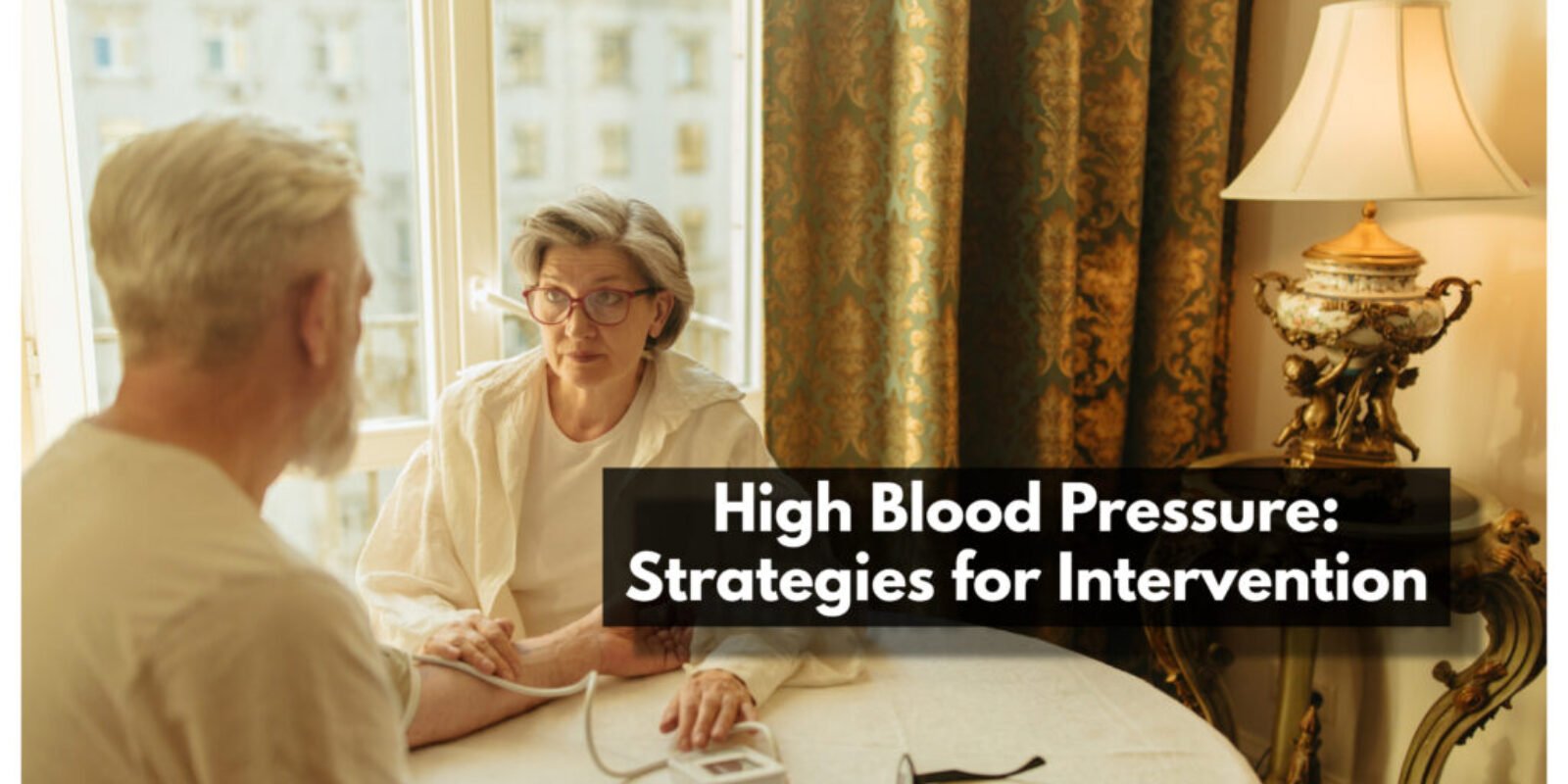Last Updated on June 30, 2025 by Julian Espinosa
High blood pressure affects nearly two-thirds of adults over 65, yet many don’t even know they have it. This “silent condition” often develops without noticeable symptoms, making regular monitoring essential for seniors.
Without proper management, hypertension can lead to serious health complications including stroke, heart attack, kidney problems, and cognitive decline. The good news? With knowledge, lifestyle adjustments, and proper medical care, you can effectively manage your blood pressure and continue enjoying an active, fulfilling life.
In this comprehensive guide, we’ll explore the unique challenges hypertension presents for seniors, practical strategies for maintaining healthy blood pressure levels, and how to work effectively with healthcare providers to create a personalized management plan. Whether you’ve recently been diagnosed with high blood pressure or are looking to optimize your current management approach, this article provides the information you need to take control of your cardiovascular health.
Understanding Blood Pressure: What Seniors Need to Know
Blood pressure is a key indicator of cardiovascular health, and understanding its readings is crucial for older adults. Each blood pressure measurement includes two numbers: systolic pressure, which occurs when your heart beats, and diastolic pressure, measured between heartbeats. Knowing the different blood pressure categories helps seniors identify when they might need medical attention or lifestyle adjustments.
What Do Blood Pressure Numbers Mean?
Blood pressure measurements consist of two numbers:
- Systolic: Pressure when your heart beats.
- Diastolic: Pressure between heartbeats.
As we mature, arteries naturally become less flexible, making it harder for blood to flow smoothly and often raising blood pressure—especially systolic pressure. Understanding these categories helps seniors identify when they might need medical attention or lifestyle adjustments.
Regular checks and recognizing changes in readings can support timely interventions. Knowing why blood pressure increases with age encourages seniors to take preventive measures early.
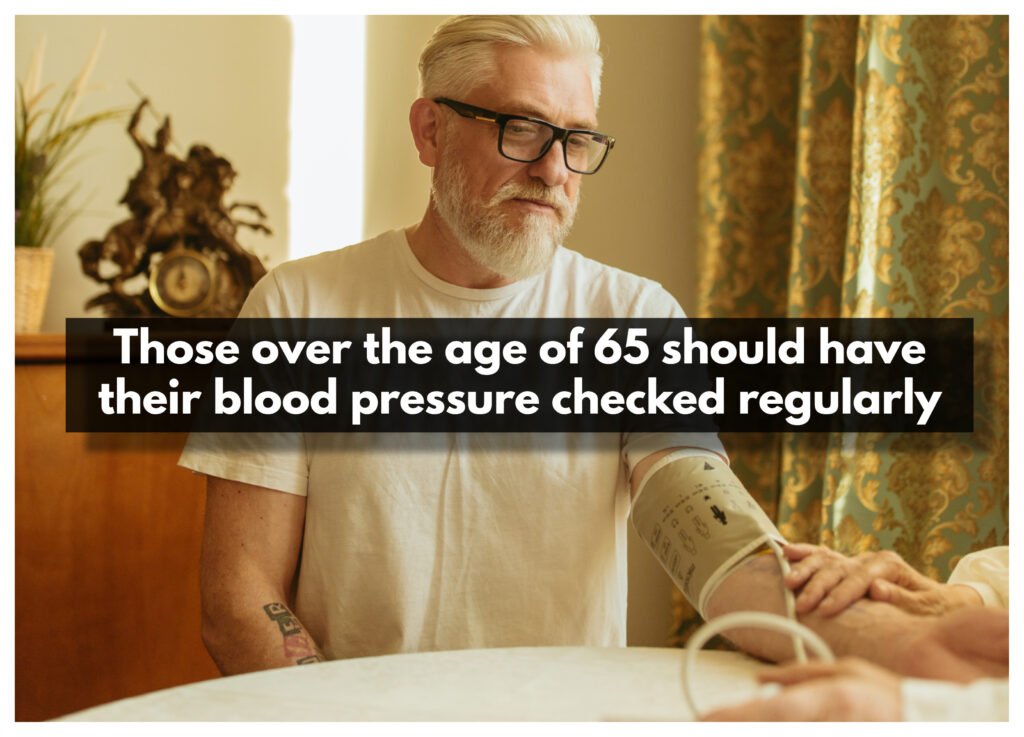
Ways Seniors Can Control Blood Pressure
High blood pressure is a critical health concern that affects many seniors. Fortunately, by understanding the risks and prevention methods associated with it, seniors can be empowered to take the necessary steps for a healthier life. The great news is that seniors can often reduce their risk with a few modifications to their lifestyle and health habits.
Prefer to listen rather than read?
Increase Physical Activity
Regular physical activity plays a crucial role in maintaining healthy blood pressure levels. Studies have shown that engaging in just five minutes of vigorous exercise daily—such as climbing stairs or short bouts of brisk walking —can significantly lower both systolic and diastolic blood pressure. This brief yet impactful activity can reduce systolic pressure by approximately 0.68 mmHg and diastolic pressure by 0.54 mmHg, potentially decreasing heart disease risk by about 10%.
Physical activity influences blood pressure through various mechanisms. Regular exercise strengthens the heart, enabling it to pump blood more efficiently, which can lead to lower blood pressure. Additionally, physical activity helps manage weight, reduce stress, and improve vascular health—all factors that contribute to optimal blood pressure regulation.
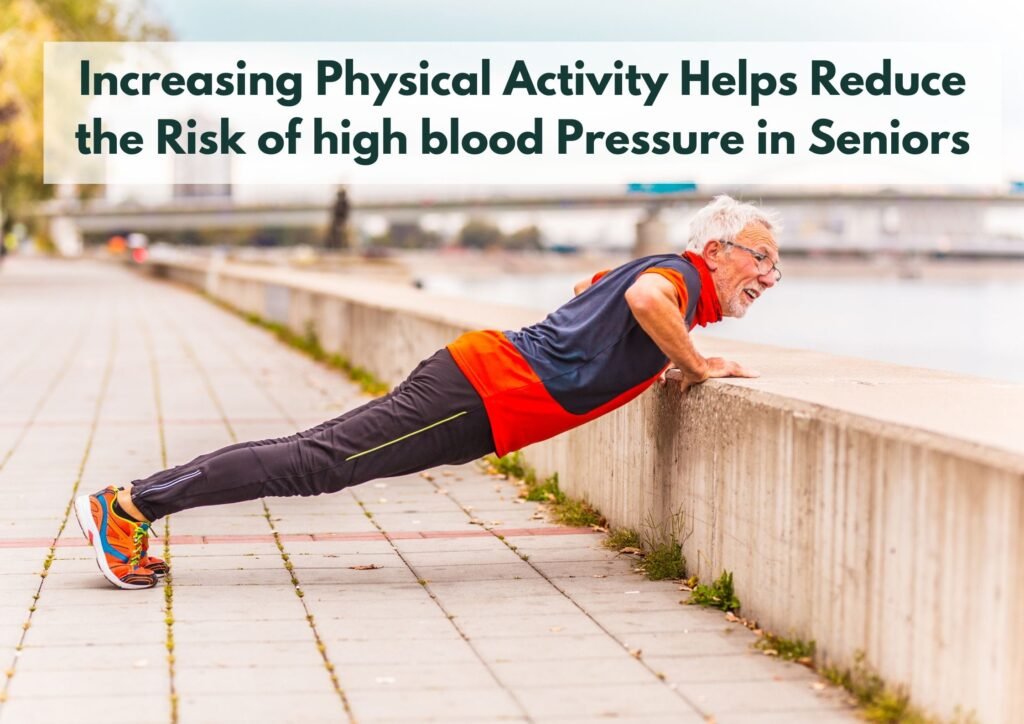
Incorporating exercises such as walking, swimming, yoga, tai chi, gardening, and cycling can significantly benefit cardiovascular health. It’s important to start slowly and gradually increase intensity, always consulting with a healthcare provider before beginning any new exercise regimen.
Recent research indicates that taking as few as 3,143 steps per day can help reduce the risk of premature death. The ideal range of daily steps for maximum health benefits is between 7,000 and 9,000 steps. Avoid high-impact activities like heavy weightlifting or marathon running, which may not be suitable for all seniors.
Listen to your body and rest as needed; do not push through pain or discomfort. Stay hydrated and wear appropriate footwear to prevent injuries. Incorporating these activities into your daily routine can lead to significant health improvements. Remember to start slowly, stay consistent, and consult with your doctor to ensure your exercise choices are safe and beneficial.
Eat a Healthy Diet (DASH Diet)
The DASH(Dietary Approaches to Stop Hypertension) diet—rich in fruits, vegetables, whole grains, and lean proteins (fish and chicken)—helps lower blood pressure. Reduce salt and unhealthy fats for best results.
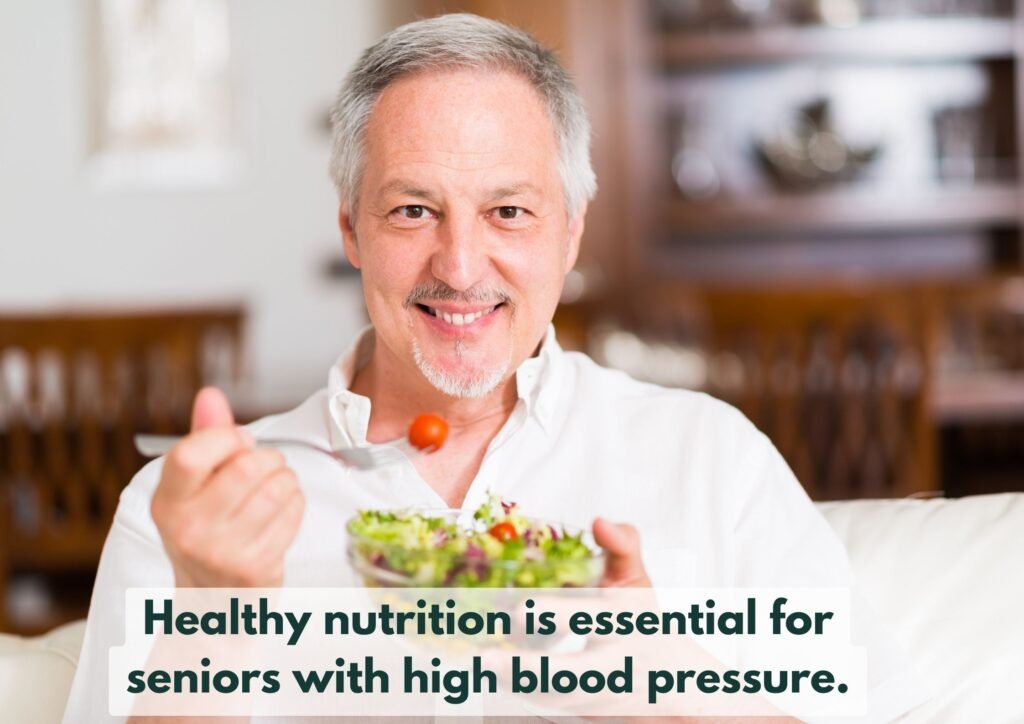
To improve your blood pressure, focus on whole grains like oats and brown rice, and load up on heart-healthy veggies like leafy greens and berries. Choose lean proteins such as fish, chicken, beans, and nuts, while avoiding too much salt by cooking fresh and seasoning with herbs.
Limit alcohol and caffeine, drink plenty of water, and opt for low-fat dairy. Eating for better blood pressure doesn’t mean sacrificing taste—it’s about making healthier choices and finding a balance that energizes and supports your well-being.
Reduce Sodium Intake
Cutting sodium intake is one of the most effective ways to reduce blood pressure. Most adults should aim to consume less than 2,300 mg of sodium per day, with ideal intake being closer to 1,500 mg. Unfortunately, the average American consumes more than 3,400 mg daily.
Maintain Healthy Weight
Carrying extra pounds increases your blood pressure, while losing even a small amount can improve your readings. A healthy BMI ranges from 18.5 to 24.9.
Quit Smoking
Smoking damages your blood vessels and can directly lead to higher blood pressure. Quitting can help your readings return to normal.
Limit Alcohol
Moderate drinking (for men, up to two drinks per day; for women, up to one) is the recommended guideline. Going beyond that can raise blood pressure significantly.
Reduce Stress
When stress hits, your body releases hormones that temporarily raise blood pressure. Finding effective ways to manage stress can have a positive impact on your heart health.
Get Quality Sleep
Poor sleep quality is linked to hypertension and other cardiovascular problems. Adults should aim for 7-9 hours of quality sleep each night.
Monitor Blood Pressure Regularly
Your blood pressure is always changing according to what you are doing to what you are feeling. Knowing how low or high your blood pressure is important, especially during your senior years. Regularly monitoring your blood pressure at home gives you accurate results without the stress that can raise readings at a doctor’s office.
How to Keep Watch
- Home Monitoring
- Grab yourself a blood pressure cuff that you can trust. Doing your checks at home means you’re more relaxed and can get readings that aren’t sky-high from just being at the doctor’s office.
- Know What’s What
- Those numbers? The top one (systolic) should ideally chill below 120, and the bottom one (diastolic) below 80. Anything above, and you’re in the yellow or red zone.
- Log It
- Write down your numbers, the date, and the time. Spotting trends over days and months can give you and your doctor the inside scoop on your heart health.
- Doctor’s Orders
- Even if you’re the king or queen of home monitoring, keep those appointments with your doctor. They’re like the seasoned coach reviewing your game tape, offering pro tips to keep you in top shape.
How to Measure Blood Pressure Accurately
Measuring your blood pressure at home is a simple process that can help you monitor your health. Here’s how:
- Prepare Yourself
- Before measuring, empty your bladder and rest quietly for five minutes.
- Get Comfortable
- Sit on a chair with your back supported, feet flat on the floor, and legs uncrossed.
- Position Your Arm
- Rest your arm on a table at heart level with the palm facing up.
- Apply the Cuff
- Place the cuff on your bare upper arm, one inch above the elbow bend. Ensure it’s snug but not tight, allowing you to slip two fingers underneath.
- Take the Reading
- Follow your monitor’s instructions, remain still, and avoid talking during the measurement.
- Repeat for Accuracy
- Take two readings, one minute apart, and record the higher result.
- Consistency is Key:
- Measure your blood pressure at the same time each day to track changes.

Important Tips:
- Choose the Right Monitor
- Use an automatic cuff-style monitor for upper-arm measurements, as wrist or finger monitors may be less accurate.
- Proper Cuff Size
- Ensure the cuff fits your arm correctly; an ill-fitting cuff can lead to inaccurate readings.
- Avoid Certain Activities Before Measuring
- Refrain from smoking, consuming caffeine, or exercising at least 30 minutes prior to taking a measurement.
Regular home monitoring can help you keep track of your blood pressure and discuss any concerns with your healthcare provider.
How to Get Accurate Readings
- Timing’s Everything
- Try to take your readings at the same time every day for consistency. If you’re testing your blood pressure before breakfast, you should do so in the next following days.
- Sit Tight
- Park yourself in a comfy chair, feet flat, arm supported at your heart level. It’s the best way to not let gravity mess with your numbers.
- Relax
- Skip the coffee, smokes, or treadmill for 30 minutes before you measure. Let your body be in its natural, calm state for the truest read.
Checking your blood pressure regularly is pretty much giving your future self better protection against high blood pressure. It’s a small daily action that can lead to big-time health wins, keeping you dancing to the beat of your own drum for years to come.
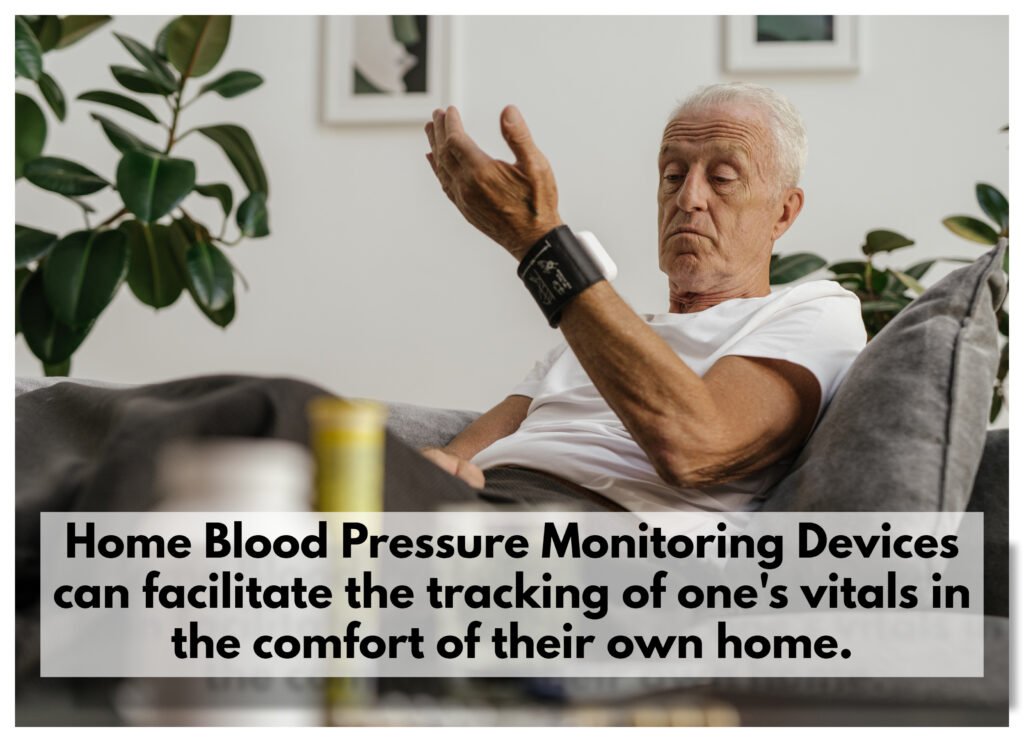
Take Prescribed Medications
Medications are a critical part of managing hypertension for many older adults. Understanding how medications work, their importance, and how lifestyle changes can complement medication use is vital. Consistent communication with healthcare providers ensures medications remain effective and suitable. Taking your prescribed blood pressure medications consistently is essential for effective control.
Adjustments and Side Effects: Part of the Journey
Your body’s needs might change over time, and so might your blood pressure. That means your medication might need a tweak here and there, similar to fine-tuning an instrument to keep it playing its best tune. Sure, sometimes medications can bring along side effects. It’s key to keep an open line with your doctor, sharing what you’re experiencing so you can tackle these issues together without throwing your health goals off track.
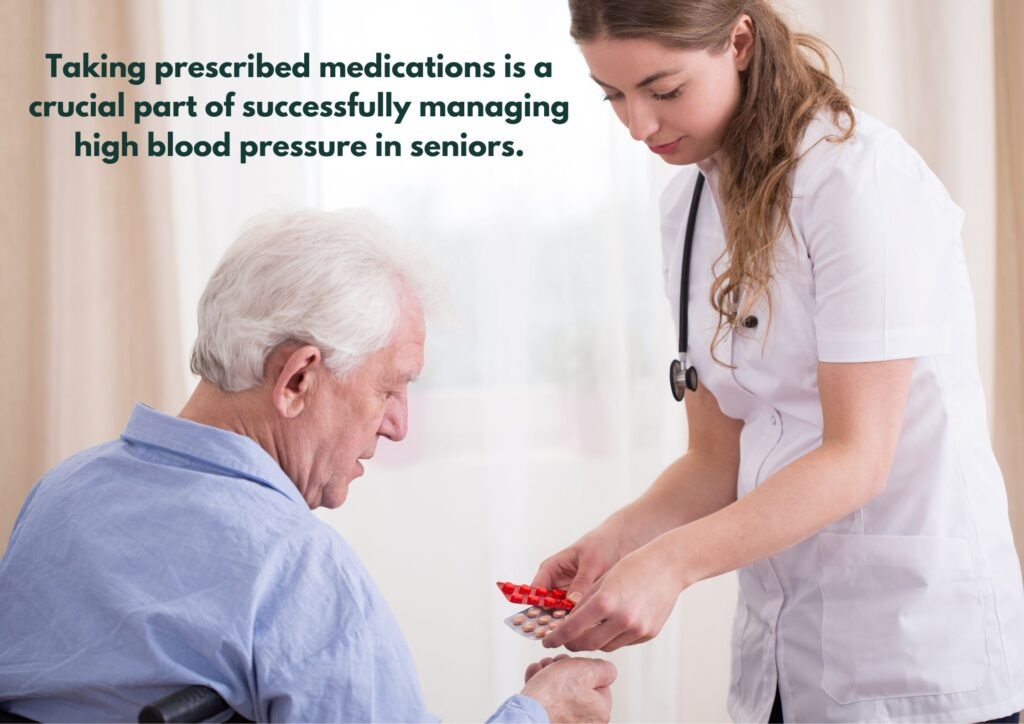
Manage Stress and Practice Relaxation Techniques
As we age, stress often becomes a part of our lives. It could stem from anywhere – maybe it’s financial worries nibbling at the edges of your mind, relationship dynamics shifting, work piling up, or health concerns growing. Stress not only affects your mood but also impacts your heart by increasing blood pressure and putting more demands on it.
The connection between the stress we lug around and the toll it takes on our heart health is more than anecdotal; it’s scientific. The strain and worry can set the stage for hypertension and give our cardiovascular system a real run for its money. This makes mastering the art of relaxation a luxury and a necessity for keeping the heart beating at a rhythm that’s music to our ears.
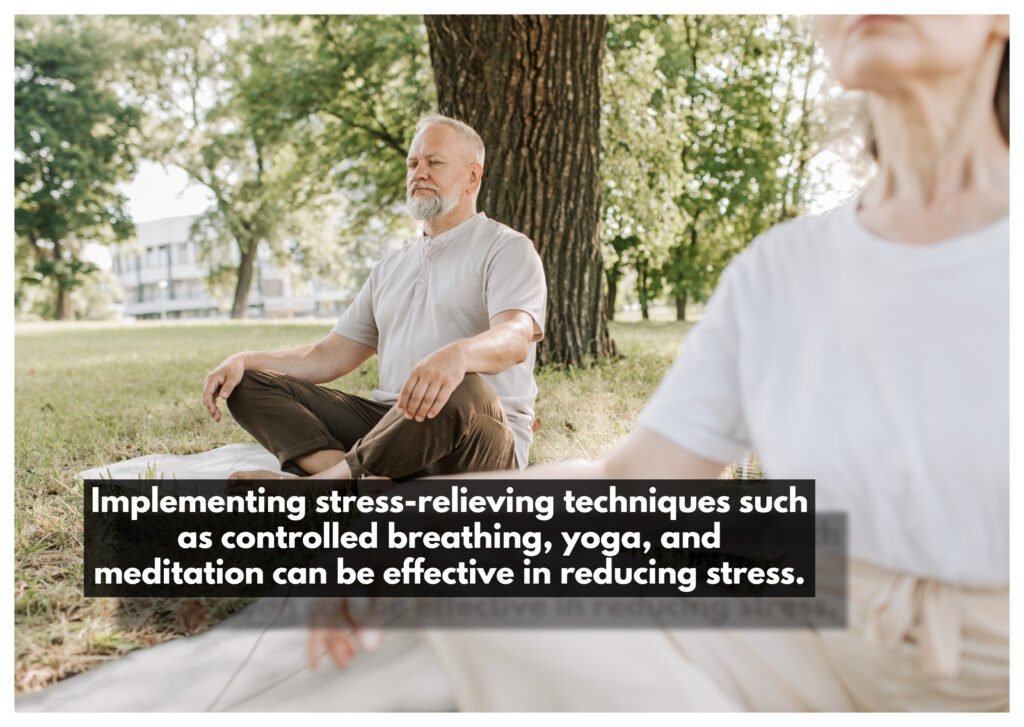
Connect with a Healthcare Provider
Maintaining a robust bond with your healthcare provider is vital in the battle against high blood pressure, particularly for seniors. This alliance extends beyond routine appointments; it’s a source of tailored advice, therapy, and comfort that you’re making progress.
Your healthcare provider is essential in managing your blood pressure, and creating a personalized treatment plan based on your medical history and risk factors. They offer support through dietary changes and exercise routines, monitoring your progress closely. Regular check-ins are crucial to track your health and adjust treatment as needed. Open dialogue and comprehensive health reviews ensure you receive necessary preventive care. Communication is key to effectively managing your blood pressure.
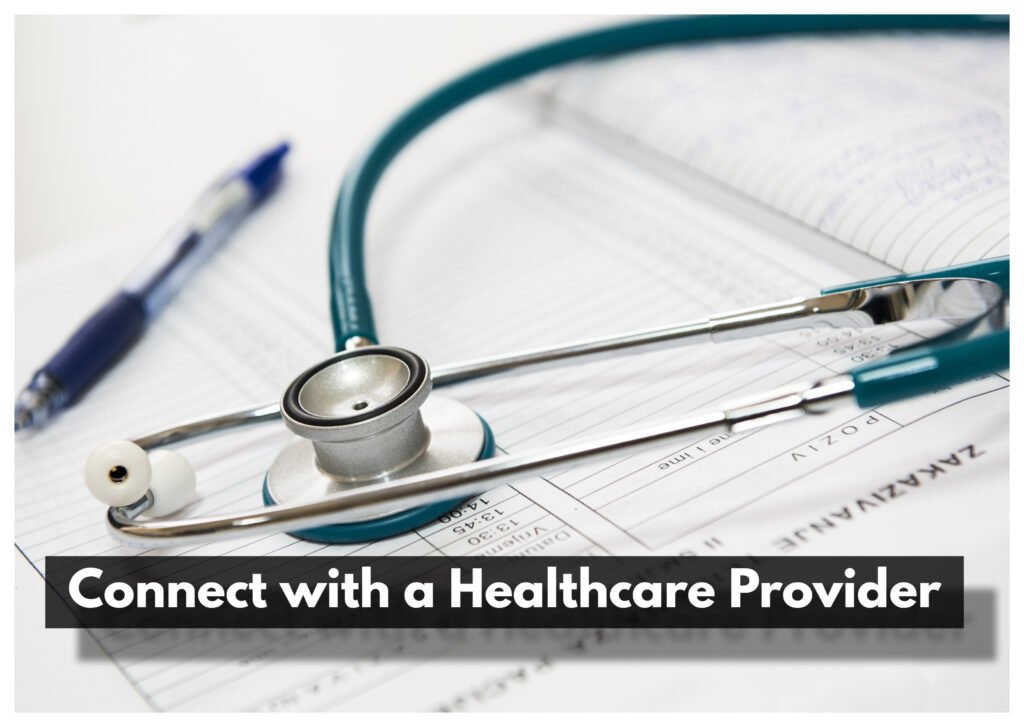
Signs and Symptoms of Senior’s High Blood Pressure
High blood pressure often moves in silence, especially among seniors, making it all the more challenging to catch in its early stages. It’s notorious for its subtlety, often presenting signs that could easily be mistaken for normal signs of aging. But knowing the nuances of its symptoms can be a game-changer, allowing for timely intervention. Let’s delve into the often-missed signs that could hint at high blood pressure in the elderly.
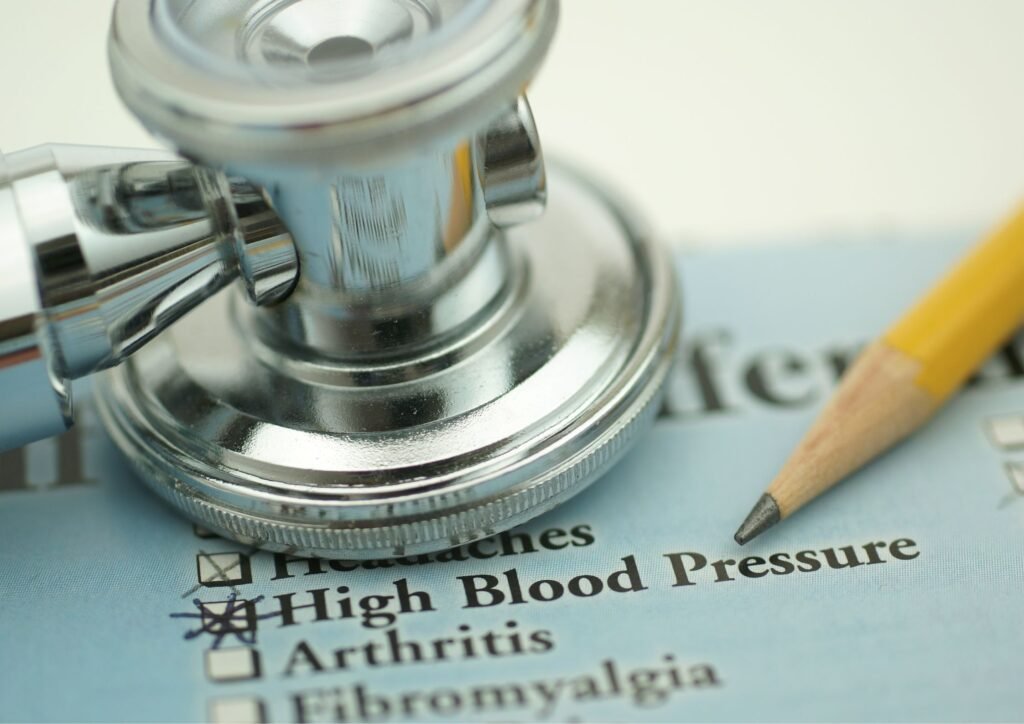
Key Symptoms to Keep an Eye On
- Persistent Headaches
- If headaches start to become a regular part of your day without a clear reason, it might be your body hinting at elevated blood pressure levels.
- Unusual Fatigue
- When simple tasks leave you more fatigued than usual, or if confusion seems to cloud your thoughts unexpectedly, it’s worth considering if your blood circulation is as optimal as it should be.
- Changes in Vision
- Experiencing sudden vision issues? High blood pressure might be affecting the blood vessels in your eyes, leading to blurriness or vision changes.
- Chest Discomfort
- Any form of chest pain, especially if it occurs during activities that usually wouldn’t cause such a sensation, should prompt a check-up. It’s a sign your heart may be under strain.
- Difficulty Breathing
- Finding yourself short of breath more often than not could be a clue that your heart is working overtime due to high blood pressure.
- Heartbeat Irregularities
- A heartbeat that feels off-rhythm, too fast, or fluttery could indicate your heart is coping with increased pressure.
- Unexpected Blood in Urine
- Though rarer, this symptom could signal kidney issues related to long-standing high blood pressure.
The Silent Need for Vigilance
High blood pressure’s ability to fly under the radar necessitates a proactive approach to health, especially in our senior years. The lack of overt symptoms doesn’t always mean everything is fine. This is where the power of observation and regular health check-ups come into play.
Making blood pressure monitoring a routine part of your health care can uncover what might otherwise remain hidden, ensuring early detection and management. Paying attention to these subtle signals can lead to conversations with your healthcare provider that may very well prevent more serious complications.
It’s about creating a culture of attentiveness to your body’s whispers before they turn into shouts. Armed with awareness and the right care, navigating the challenges of high blood pressure can be less daunting, paving the way for a healthier, more active life even in senior years.
Long-Term Effects of Uncontrolled High Blood Pressure in Seniors
One of the most severe and concerning long-term effects of uncontrolled high blood pressure in seniors is the potential for stroke. A stroke occurs when a clot blocks the flow of blood to the brain and can result in permanent brain damage and even death.
Potential for Stroke
High blood pressure in seniors can be a real health risk if not addressed and managed properly. Over time, it can cause hardening and narrowing of the arteries, often referred to as arteriosclerosis. When this happens, it reduces the blood flow to vital organs such as the brain, the heart, and the kidneys. Thus, putting a person at greater risk of stroke, heart attack, and other serious medical conditions.
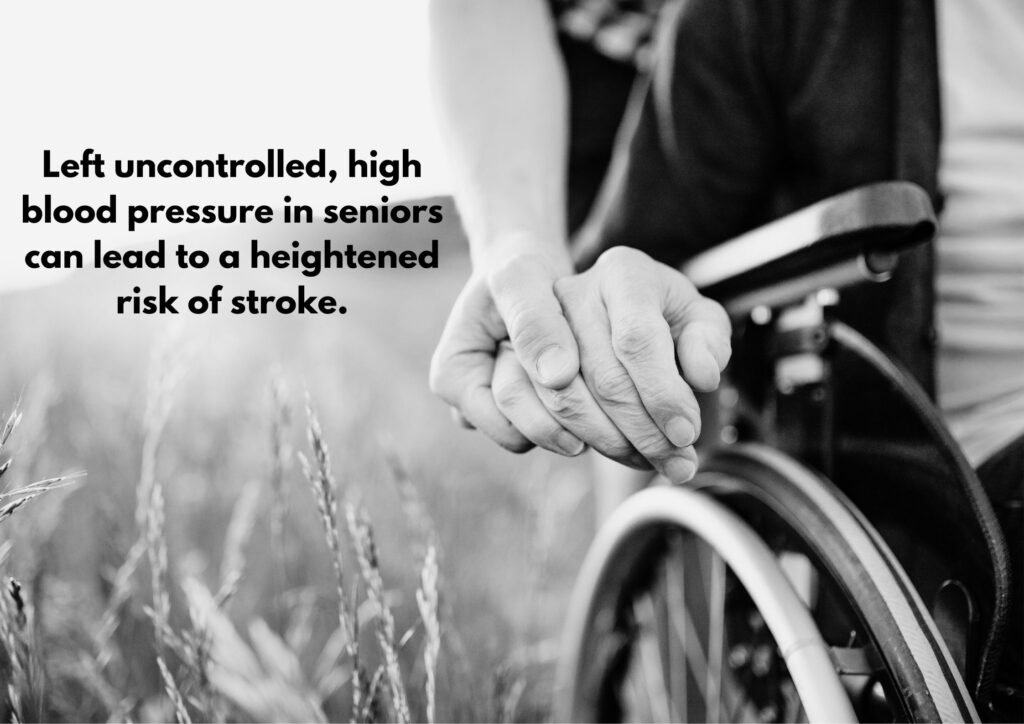
Can Cause a Variety of Serious Health Problems
High blood pressure in seniors can be particularly dangerous, as it can cause a variety of serious health problems. An aneurysm, chest pain, and even organ failure can all be the result of uncontrolled high blood pressure. However, these problems are not limited to physical ailments.
Can Lead to Depression and Anxiety
Uncontrolled high blood pressure in seniors can also lead to mental and emotional problems, such as depression and anxiety. It’s important to keep an eye on your senior loved ones and ensure they are controlling their high blood pressure, as the consequences can be devastating.
These potential health issues can be life-altering and greatly reduce the quality of life for seniors.
Common Challenges in Managing High Blood Pressure in Seniors
In our collective efforts to support long and healthy lives among seniors with high blood pressure, understanding the unique challenges they face is essential. Even with the best intentions, several common obstacles can make blood pressure management more difficult for older adults.
- Multiple Medication Management
- Many seniors take various prescriptions for different conditions. Coordinating these medications without harmful interactions requires careful planning and consistent communication with healthcare providers.
- Age-Related Physiological Changes
- As we mature, our bodies process medications differently. This may necessitate adjustments in dosage or treatment approaches that work harmoniously with age-related changes.
- Financial Considerations
- The cost of medications, healthy food options, and regular medical check-ups can place a financial strain on seniors with fixed incomes. Exploring assistance programs and affordable healthcare options becomes essential.
- Memory and Cognitive Challenges
- Remembering to take medications on schedule and follow treatment plans can become more challenging with age. Simple reminder systems and family support can make a significant difference.
- Mobility Limitations
- Physical limitations may make regular exercise and pharmacy visits difficult. Finding appropriate exercises that accommodate mobility concerns and utilizing delivery services can help overcome these barriers.
- Social Isolation
- Many seniors experience periods of isolation, which can affect their motivation and ability to maintain health routines. Community engagement and support networks play crucial roles in successful management.
- Understanding Technology
- Blood pressure monitors and other health management tools often have technological components that some seniors find challenging. Simplified devices and patient education can bridge this gap.
By acknowledging these challenges, we can develop more effective strategies to help seniors navigate the complexities of high blood pressure management, promoting better outcomes and improved quality of life.
Uncover the Secrets of Managing High Blood Pressure in Seniors!
Ready to challenge your knowledge and see how much you’ve learned about Blood Pressure in Seniors?
Conclusion
In conclusion, it is essential for aged persons to maintain a healthy lifestyle to reduce their risk of high blood pressure and other age-related medical conditions. A balanced diet is of utmost importance, as it helps to maintain vital nutrient levels necessary for good health.
Eating foods rich in fruits, vegetables, whole grains, lean protein, and healthy fats will help to promote good blood pressure. Regular exercise can also help to reduce the risk of high blood pressure in seniors, as well as reduce stress, keep weight in check, and strengthen muscles, bones, and the heart.
Getting enough sleep is also important for keeping blood pressure in a healthy range. It is recommended to get 7-8 hours of sleep per night in order to stay healthy. Doctors should continue to monitor and treat patients with high blood pressure medication, lifestyle interventions, and other strategies to ensure their blood pressure levels remain within a healthy range.
Well, what do you think? Are you ready to apply these strategies to avoid high blood pressure in your golden years? If you enjoyed reading this, you might also enjoy reading 10 Quick and Easy Meal Ideas for Seniors Living Solo.
Frequently Asked Questions
- What defines high blood pressure for seniors?
- For adults 65 and older, high blood pressure is generally defined as readings consistently at or above 130/80 mmHg. However, treatment goals may vary based on individual health conditions and overall fitness. Some healthcare providers may set different targets depending on other health factors and medication tolerance.
- How often should seniors check their blood pressure?
- Seniors with diagnosed hypertension should monitor their blood pressure at least 2-3 times per week, preferably at the same time of day. Those with well-controlled blood pressure might check less frequently, while those with recent medication changes or unstable readings might need daily monitoring. Always follow your healthcare provider’s specific recommendations.
- Can blood pressure medications be reduced as we age?
- In some cases, yes. As lifestyle changes take effect or as aging alters how medications affect the body, dosages might be adjusted. Never modify your medication regimen without consulting your healthcare provider first. Regular reviews of your medication effectiveness and side effects are important parts of hypertension management.
- What role does sleep play in blood pressure management?
- Quality sleep is crucial for blood pressure regulation. Poor sleep patterns can elevate blood pressure and stress hormones. Seniors should aim for 7-8 hours of uninterrupted sleep and address sleep disorders like sleep apnea, which can significantly impact blood pressure levels. Creating a consistent sleep schedule and a comfortable sleeping environment can improve both sleep quality and blood pressure control.
- Are there special considerations for managing blood pressure during hot weather?
- Yes, heat can affect blood pressure and how medications work. During hot weather, seniors should stay well-hydrated, avoid excessive heat exposure, monitor blood pressure more frequently, and be aware of potential symptoms of heat-related illness which can be exacerbated by some blood pressure medications. Some people may need medication adjustments during extreme temperature changes.
- How do I know if my home blood pressure monitor is accurate?
- To ensure accuracy, have your home monitor validated against readings at your healthcare provider’s office at least once a year. Look for devices certified by organizations like the Association for the Advancement of Medical Instrumentation. Follow the manufacturer’s instructions for proper cuff placement and body positioning, and replace batteries regularly. Consider bringing your device to appointments so your healthcare team can check its accuracy.
- Can stress management techniques really make a difference in blood pressure readings?
- Absolutely. Research shows that regular practice of relaxation techniques like deep breathing, meditation, or tai chi can lower systolic blood pressure by 5-8 mmHg on average. The effect is most pronounced when these practices become part of your daily routine rather than occasional activities. Even spending 10-15 minutes daily on stress reduction can yield measurable improvements in blood pressure over time.
References
- American Heart Association. (2023). “Guideline for the Management of Patients With Chronic Coronary Disease.”
- Mayo Clinic. (2023). “High blood pressure (hypertension).”
- National Institute on Aging. (2023). “High Blood Pressure and Older Adults.”
- Centers for Disease Control and Prevention. (2023). “Facts About Hypertension.“
- World Health Organization. (2023). “Hypertension.”
Disclaimer
The content provided on MySeniors.World is for informational purposes only and is not intended as either financial or medical advice. Always consult a qualified professional before making any investment or health-related decisions.
Posts may contain affiliate links, meaning we earn a commission – at no additional cost to you, if you click through and make a purchase. Your support helps us continue providing valuable content.
